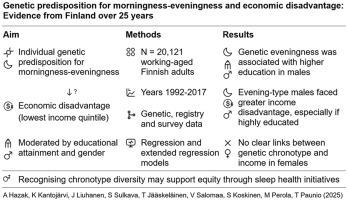Genetic predisposition for morningness-eveningness and economic disadvantage: Evidence from Finland over 25 years
IF 3.4
2区 医学
Q1 CLINICAL NEUROLOGY
引用次数: 0
Abstract
Objectives
Individual chronotype may shape economic outcomes through alignment or misalignment with work and societal schedules. Genome-wide association studies suggest that morningness–eveningness has a partially genetic basis. This study examines how genetic predisposition to chronotype relates to economic disadvantage, using polygenic indices for morningness–eveningness both as predictors and as instruments for phenotypic chronotype.
Methods
Employing various regression and extended regression models, we studied data from 20,121 working-aged adults representative of Finnish regions, combining genetic, registry, and survey data from 1992 to 2017.
Results
Genetic markers for morningness were monotonically negatively associated with educational attainment (p = 0.002)—a key determinant of economic success—particularly in males. Conversely, the same genetic markers were also monotonically negatively associated with the likelihood of belonging to the lowest income quintile in males (p = 0.012), suggesting differential valuation of chronotype traits in education versus the labour market. This pattern emerged in post-2000. Furthermore, among males with higher education, genetic predisposition to eveningness was linked to a higher likelihood of falling into the lowest income quintile (p < 0.001), indicating reduced economic returns to their education. No significant associations between chronotype-related genetic markers and income were observed in females across education levels.
Conclusions
This study reveals emerging, gender-specific inequalities in how genetically influenced chronotype traits relate to economic outcomes. Genetic predisposition to eveningness favoured education but hindered income—especially in highly educated males—via phenotypic chronotype pathways. Though modest, these effects highlight the need for workplace inclusion through recognition of chronotype diversity, public sleep health initiatives, and flexible work structures.

早睡晚睡和经济劣势的遗传倾向:来自芬兰25年的证据。
目标:个体的时间类型可能通过与工作和社会时间表的一致或不一致来影响经济结果。全基因组关联研究表明,早起晚起有部分遗传基础。本研究考察了生物钟的遗传易感性与经济劣势之间的关系,使用早起-晚睡的多基因指数作为表型生物钟的预测指标和工具。方法:采用各种回归和扩展回归模型,结合1992年至2017年的遗传、登记和调查数据,研究了芬兰地区20,121名具有代表性的工作年龄成年人的数据。结果:早起的基因标记与受教育程度呈单调负相关(p = 0.002),而受教育程度是经济成功的关键决定因素,尤其是在男性中。相反,相同的遗传标记也单调地与男性属于最低收入五分之一的可能性负相关(p = 0.012),这表明教育与劳动力市场对时间型特征的不同评估。这种模式出现在2000年后。此外,在受过高等教育的男性中,夜场性格的遗传倾向与落入收入最低的五分之一的可能性更高(p)。结论:这项研究揭示了基因影响的时型特征与经济成果之间的关系中出现的性别不平等现象。夜猫子的遗传倾向通过表型时型途径有利于受教育,但不利于收入——尤其是在受过高等教育的男性中。尽管影响不大,但这些影响强调了通过承认生物钟多样性、公共睡眠健康倡议和灵活的工作结构来实现工作场所包容性的必要性。
本文章由计算机程序翻译,如有差异,请以英文原文为准。
求助全文
约1分钟内获得全文
求助全文
来源期刊

Sleep medicine
医学-临床神经学
CiteScore
8.40
自引率
6.20%
发文量
1060
审稿时长
49 days
期刊介绍:
Sleep Medicine aims to be a journal no one involved in clinical sleep medicine can do without.
A journal primarily focussing on the human aspects of sleep, integrating the various disciplines that are involved in sleep medicine: neurology, clinical neurophysiology, internal medicine (particularly pulmonology and cardiology), psychology, psychiatry, sleep technology, pediatrics, neurosurgery, otorhinolaryngology, and dentistry.
The journal publishes the following types of articles: Reviews (also intended as a way to bridge the gap between basic sleep research and clinical relevance); Original Research Articles; Full-length articles; Brief communications; Controversies; Case reports; Letters to the Editor; Journal search and commentaries; Book reviews; Meeting announcements; Listing of relevant organisations plus web sites.
 求助内容:
求助内容: 应助结果提醒方式:
应助结果提醒方式:


